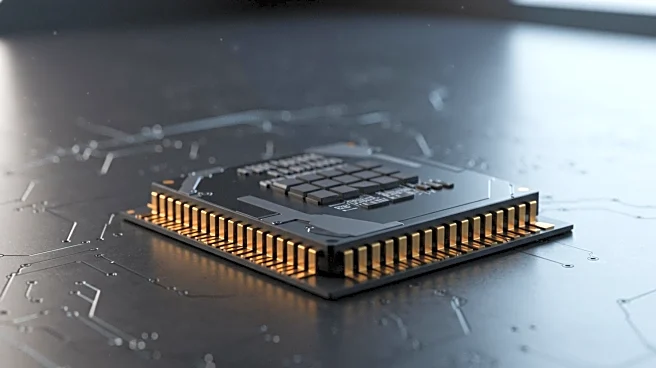What is the story about?
What's Happening?
President Trump announced that the U.S. government will acquire a 10% stake in Intel, a move that represents a significant intervention in corporate America. The deal involves the government purchasing 433.3 million shares of Intel at $20.47 per share, totaling approximately $8.9 billion. This acquisition is part of a broader strategy to convert government grants into equity shares, ensuring Intel receives about $10 billion in funds for expanding its manufacturing capabilities in the U.S. The funding sources include $5.7 billion from the CHIPS Act and $3.2 billion from the Secure Enclave program. This agreement follows a series of meetings between President Trump and Intel CEO Lip-Bu Tan, amid previous tensions over Tan's ties to Chinese firms.
Why It's Important?
This development is significant as it highlights the U.S. government's increasing involvement in corporate affairs, particularly in the tech sector. The acquisition aims to bolster Intel's manufacturing capabilities, which is crucial for maintaining competitiveness in the global semiconductor market. The move also reflects a strategic effort to secure domestic production of critical technologies, reducing reliance on foreign entities. However, this intervention raises concerns about the potential risks and implications of government ownership in private companies. Critics argue that such actions could create new categories of corporate risk and influence market dynamics.
What's Next?
The U.S. government's stake in Intel is expected to be passive, with no board representation, although it will vote with Intel's board on shareholder matters. The deal includes a five-year warrant for an additional 5% of Intel stock, which the government can exercise if Intel loses control of its foundry business. This federal backing may provide Intel with the necessary support to revitalize its foundry unit and compete with industry leaders like TSMC. However, Intel faces ongoing challenges in its central processor business and must attract customers to its new factories to regain market share.
Beyond the Headlines
The government's intervention in Intel could set a precedent for future corporate engagements, potentially influencing how other tech companies navigate government relations. This move also underscores the strategic importance of the semiconductor industry in national security and economic policy. As Intel works to overcome its financial and operational challenges, the company's ability to innovate and compete globally will be closely watched by industry stakeholders.
















